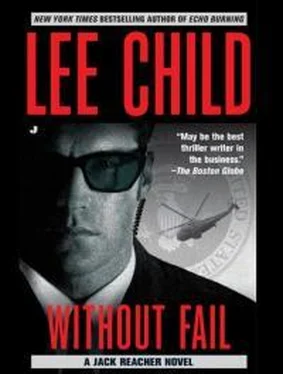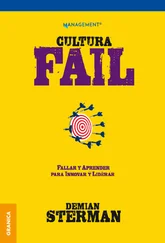Ли Чайлд - Without Fail
Здесь есть возможность читать онлайн «Ли Чайлд - Without Fail» весь текст электронной книги совершенно бесплатно (целиком полную версию без сокращений). В некоторых случаях можно слушать аудио, скачать через торрент в формате fb2 и присутствует краткое содержание. Жанр: Крутой детектив, Триллер, на английском языке. Описание произведения, (предисловие) а так же отзывы посетителей доступны на портале библиотеки ЛибКат.
- Название:Without Fail
- Автор:
- Жанр:
- Год:неизвестен
- ISBN:нет данных
- Рейтинг книги:3 / 5. Голосов: 1
-
Избранное:Добавить в избранное
- Отзывы:
-
Ваша оценка:
- 60
- 1
- 2
- 3
- 4
- 5
Without Fail: краткое содержание, описание и аннотация
Предлагаем к чтению аннотацию, описание, краткое содержание или предисловие (зависит от того, что написал сам автор книги «Without Fail»). Если вы не нашли необходимую информацию о книге — напишите в комментариях, мы постараемся отыскать её.
The secretive, closed organization that invites Jack Reacher in is the Secret Service, the organization that protects the Presidency. Someone who was once close to Reacher’s brother, needs help in her new job. Her new job? Saving the Vice President of the United States from being assassinated.
Without Fail — читать онлайн бесплатно полную книгу (весь текст) целиком
Ниже представлен текст книги, разбитый по страницам. Система сохранения места последней прочитанной страницы, позволяет с удобством читать онлайн бесплатно книгу «Without Fail», без необходимости каждый раз заново искать на чём Вы остановились. Поставьте закладку, и сможете в любой момент перейти на страницу, на которой закончили чтение.
Интервал:
Закладка:
Reacher nodded. The desktop looked like the foredeck of a battleship made ready for inspection by an admiral. A speck of dust would have stood out.
“Eight o’clock Thursday morning, the secretary comes in again,” Froelich said. “She walks straight to her own desk and starts work. Doesn’t open Stuyvesant’s door at all. Ten after eight, Stuyvesant himself shows up. He’s carrying a briefcase and wearing a raincoat. He takes off the raincoat and hangs it up on the coatrack. His secretary speaks to him and he sets his briefcase upright on her desk and confers with her about something. Then he opens his door and walks into his office. He’s not carrying anything. He’s left his briefcase on the secretary’s desk. About four or five seconds later he comes back out. Calls his secretary in. They both confirm that at that point, the sheet of paper was there on the desk.”
Neagley glanced around the office, at the door, at the desk, at the distance between the door and the desk.
“Is this just their testimony?” she asked. “Or do the surveillance cameras record to videotape?”
“Both,” Froelich said. “All the cameras record to separate tapes. I’ve looked at this one, and everything happens exactly as they describe it, coming and going.”
“So unless they’re in it together, neither of them put the paper there.”
Froelich nodded. “That’s the way I see it.”
“So who did?” Reacher asked. “What else does the tape show?”
“The cleaning crew,” Froelich said.
She led them back to her own office and took three video-cassettes out of her desk drawer. Stepped over to a bank of shelves, where a small Sony television with a built-in VCR nestled between a printer and a fax machine.
“These are copies,” she said. “The originals are locked away. The recorders work on timers, six hours on each tape. Six in the morning until noon, noon until six, six until midnight, midnight until six, and start again.”
She found the remote in a drawer and switched the television on. Put the first tape in the mechanism. It clicked and whirred and a dim picture settled on the screen.
“This is the Wednesday evening,” she said. “Six P.M. onward.”
The picture was gray and milky and the detail definition was soft, but the clarity was completely adequate. The camera showed the whole square area from behind the secretary’s head. She was at her desk, on the phone. She looked old. She had white hair. Stuyvesant’s door was on the right of the picture. It was closed. There was a date and time burned into the picture at the bottom left. Froelich hit fast wind and the motion sped up. The secretary’s white head moved with comical jerkiness. Her hand batted up and down as she finished calls and fielded new ones. Some person bustled into shot and delivered a stack of internal mail and turned and bustled away. The secretary sorted the mail with the speed of a machine. She opened every envelope and piled the contents neatly and took out a stamp and ink pad and stamped every new letter at the top.
“What’s she doing?” Reacher asked.
“Date of receipt,” Froelich said. “This whole operation runs on accurate paperwork. Always has.”
The secretary was using her left hand to curl each sheet back and her right to stamp the date. The tape’s fast motion made her look frantic. In the bottom corner of the picture the date held steady and the time unspooled just about fast enough to read. Reacher turned away from the screen and looked around Froelich’s office. It was a typical government space, pretty much the civilian equivalent of the offices he’d spent his time in, aggressively plain and expensively shoehorned into a fine old building. Tough gray nylon carpet, laminate furniture, IT wiring routed carefully in white plastic conduit. Foot-high piles of paper everywhere, reports and memoranda tacked to the walls. There was a glass-fronted cabinet with a yard of procedure manuals inside. There was no window in the room. But she still had a plant. It was in a plastic pot on the desk, pale and dry and struggling to survive. There were no photographs. No mementos. Nothing personal at all except a faint trace of her perfume in the air and the fabric of her chair.
“OK, this is where Stuyvesant goes home,” she said.
Reacher looked back at the screen and saw the time counter race through seven-thirty, and then seven-thirty-one. Stuyvesant stepped out of his office at triple speed. He was a tall man, wide across the shoulders, slightly stooped, graying at the temples. He was carrying a slim briefcase. The video made him move with absurd energy. He raced across to the coat rack and took down a black raincoat. Hurled it onto his shoulders and raced back to the secretary’s desk. Bent abruptly and said something and raced away again out of sight. Froelich pressed the fast wind button harder and the speed redoubled again. The secretary jerked and swayed in her seat. The time counter blurred. As the seven turned to an eight the secretary jumped up and Froelich slowed the tape back to triple speed in time to catch her opening Stuyvesant’s door for a second. She held on to the handle and leaned inside with one foot off the ground and turned immediately and closed the door. Rushed around the square space and collected her purse and an umbrella and a coat and disappeared into the gloom at the far end of the corridor. Froelich doubled the playback speed once again and the time counter unspooled faster but the picture remained entirely static. The stillness of a deserted office descended and held steady as time rushed by.
“When do the cleaners come in?” Reacher asked.
“Just before midnight,” Froelich said.
“That late?”
“They’re night workers. This is a round-the-clock operation.”
“And there’s nothing else visible before then?”
“Nothing at all.”
“So spool ahead. We get the picture.”
Froelich operated the buttons and shuttled between fast-forward with snow on the screen and regular-speed playback with a picture to check the timecode. At eleven-fifty P.M. she let the tape run. The counter clicked ahead, a second at a time. At eleven fifty-two there was motion at the far end of the corridor. A team of three people emerged from the gloom. There were two women and a man, all of them wearing dark overalls. They looked Hispanic. They were all short and compact, dark-haired, stoic. The man was pushing a cart. It had a black garbage bag locked into a hoop at the front, and trays stacked with cloths and spray bottles on shelves at the rear. One of the women was carrying a vacuum cleaner. It rode on her back like a pack. It had a long hose with a broad nozzle. The other woman was carrying a bucket in one hand and a mop in the other. The mop had a square foam pad on the head and a complicated hinge halfway up the handle, for squeezing excess water away. All three of them were wearing rubber gloves. The gloves looked pale on their hands. Maybe clear plastic, maybe light yellow. All three of them looked tired. Like night workers. But they looked neat and clean and professional. They had tidy haircuts and their expressions said: we know this ain’t the world’s most exciting job, but we’re going to do it properly . Froelich paused the tape and froze them as they approached Stuyvesant’s door.
“Who are they?” Reacher asked.
“Direct government employees,” Froelich said. “Most office cleaners in this city are contract people, minimum wage, no benefits, high-turnover nobodies. Same in any city. But we hire our own. The FBI, too. We need a high degree of reliability, obviously. We keep two crews at all times. They’re properly interviewed, they’re background-checked, and they don’t get in the door unless they’re good people. Then we pay them real well, and give them full health plans, and dental, and paid vacations, the whole nine yards. They’re department members, same as anybody else.”
Читать дальшеИнтервал:
Закладка:
Похожие книги на «Without Fail»
Представляем Вашему вниманию похожие книги на «Without Fail» списком для выбора. Мы отобрали схожую по названию и смыслу литературу в надежде предоставить читателям больше вариантов отыскать новые, интересные, ещё непрочитанные произведения.
Обсуждение, отзывы о книге «Without Fail» и просто собственные мнения читателей. Оставьте ваши комментарии, напишите, что Вы думаете о произведении, его смысле или главных героях. Укажите что конкретно понравилось, а что нет, и почему Вы так считаете.











